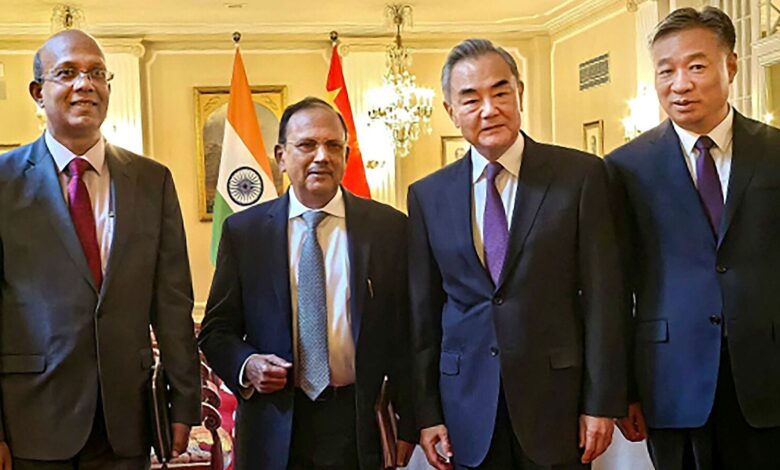‘Disengagement of troops in four areas in Ladakh,’ China says, ‘Border situation is now stable’

The Chinese Foreign Ministry said on Friday that troops have withdrawn from four locations in Eastern Ladakh, including Galwan Valley.
It also highlighted that during their recent meeting in Russia, India and China agreed to collaborate on creating favorable conditions for enhancing bilateral relations.
“National Security Advisor Ajit Doval and Chinese Foreign Minister Wang Yi held talks on the sidelines of a meeting of the BRICS high-ranking officials responsible for security matters in St Petersburg in Russia on Thursday where they discussed the progress made in the recent consultations on border issues,” the Chinese Foreign Ministry said in a press release.
When asked if the two countries were nearing a breakthrough to restore the bilateral ties that have been frozen for over four years due to the military standoff in Eastern Ladakh, Chinese Foreign Ministry spokesperson Mao Ning responded at a media briefing on Friday. She stated that the two militaries have achieved disengagement in four areas and that the border situation is now stable.
“In recent years, front-line armies of the two countries have realised disengagement in four areas in the Western sector of the China-India border, including the Galwan Valley. The China-India border situation is generally stable and under control,” Mao said.
Her comments came a day after External Affairs Minister S Jaishankar said in Geneva that roughly 75 per cent of the “disengagement problems” with China had been sorted out, but the bigger issue has been the increasing militarization of the frontier.
Doval and Wang are the Special Representatives for the India-China border talks mechanism.
Elaborating further about the Doval-Wang meeting, the Chinese Foreign Ministry released a statement that both parties expressed the belief that the stability of the China-India relations is in the fundamental and long-term interests of the two peoples and conducive to regional peace and development.
China and India agreed to implement the consensus reached by the heads of the two countries, enhance mutual understanding and trust, maintain continuous communication, and create conditions for boosting bilateral ties, it said.
Wang, also a member of the Political Bureau of the Communist Party of China Central Committee, stressed that facing a turbulent world, China and India as two ancient eastern civilisations and emerging developing countries should adhere to independence, choose unity and cooperation, and avoid consuming each other, state-run Xinhua news agency reported.
Wang expressed the hope that the two sides will properly handle their differences in a pragmatic approach and find the right way to get along with each other and push the China-India relations back on track for healthy, stable, and sustainable development.
“During their Thursday meeting, both Wang and Doval discussed progress made in recent consultation on border issues and agreed to deliver on the common understandings reached by leaders of the two countries, enhance mutual understanding and trust, create conditions for improving bilateral ties and maintain communication to this end,” she said.
A press release on the talks issued by the Ministry of External Affairs (MEA) said India and China on Thursday agreed to work with “urgency” and “redouble” their efforts to achieve complete disengagement in the remaining friction points in eastern Ladakh.
In the meeting, Doval conveyed to Wang that peace and tranquillity in border areas and respect for the Line of Actual Control (LAC) are essential for the return of normalcy in bilateral ties, the MEA press release said.
The meeting between Doval and Wang took place two weeks after India and China held diplomatic talks, during which they agreed to enhance communication through both diplomatic and military channels to address unresolved issues.
Since May 2020, the Indian and Chinese militaries have been engaged in a standoff, and while there has been some disengagement at various friction points, a complete resolution of the border dispute has not yet been achieved. Relations between the two countries deteriorated sharply after the intense clash in Galwan Valley in June 2020, which was the most severe military conflict between them in decades.
India has maintained that normalizing relations with China is contingent upon establishing peace in the border areas. To address the standoff, the two sides have conducted 21 rounds of Corps Commander-level talks.
Catch all the Business News , Breaking News Events and Latest News Updates on Live Mint. Download The Mint News App to get Daily Market Updates.
MoreLess
First Published:
14 Sep 2024, 10:09 AM IST
Business NewsNewsWorld‘Disengagement of troops in four areas in Ladakh,’ China says, ‘Border situation is now stable’



